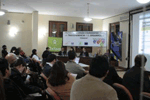Paraguay
Published on Fri, 2011-06-24 09:32
Sources: Centro de Documentación y Estudios, Diario Al Día, Decidamos (Campaña por la Expresión Ciudadana). One of the “huge mistakes” defended “as great truths” in Paraguay is that businesspeople “pay a lot” to the revenue service while in fact “direct taxation, which is the most unfair, is the largest” and “poor people end up paying more than the rich”, according to a report by economist José Carlos Rodríguez. The report was presented this month at the launching of the programme “Impuestos justos para inversión social” [Fair taxes for social investment] promoted by the |
|
Source: . Published on Fri, 2010-12-03 10:25
» |
|
Published on Thu, 2010-12-02 13:03
Video:
|
|
Paraguay’s current Government has set three priority focus areas: social and human development, a productive economy and institutional policy. Thanks to increased income from taxation and plans for development assistance, there are now more resources to meet the needs of the people, invest in infrastructure and still comply with debt commitments. The Government should also revise the existing development model in order to bring about a fairer distribution of wealth and provide better protection for vulnerable population sectors. To do this, the State will have to coordinate its efforts with organizations from all sectors of society.
|
|
Despite the serious setbacks expected as a result of the international financial crisis, the outlook for Paraguay could be worse. The country has a low level of external debt (due in part to the difficulty of previous governments in implementing earlier loans), a respectable level of international reserves, and an economy largely based on exporting agricultural commodities. A small country such as Paraguay, which produces food and clean energy and has plenty of fresh water and fertile land, has comparative advantages that can and should be strengthened.
|





